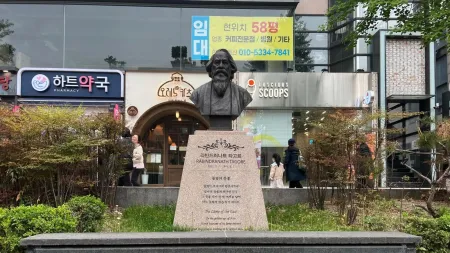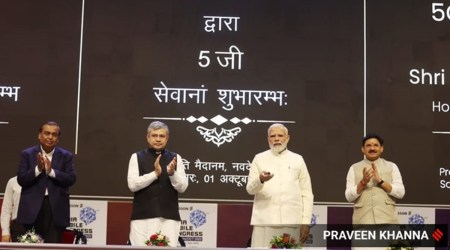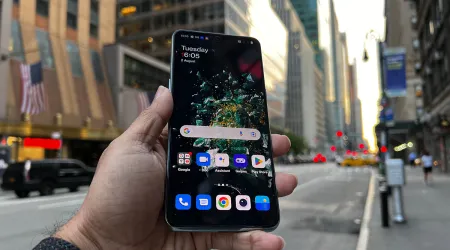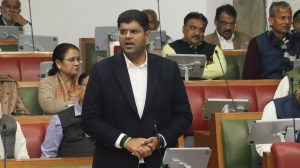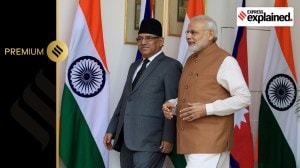- India
- International
It’s time to become bio-manufacturing hub of the world: Deepanwita Chattopadhyay, CEO, IKP Knowledge Park
With a rich experience in mentoring startups, Deepanwita works with Indian and global partners to nurture and fund innovation projects and early startups in the life sciences space.
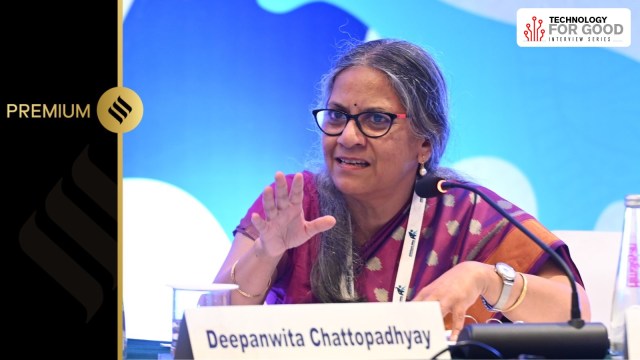 Deepanwita is a member of the Global Advisory Council of the International Association of Science Parks (IASP) with its global headquarters in Malaga, Spain. (Photo credit: Deepanwita Chattopadhyay)
Deepanwita is a member of the Global Advisory Council of the International Association of Science Parks (IASP) with its global headquarters in Malaga, Spain. (Photo credit: Deepanwita Chattopadhyay)Deepanwita Chattopadhyay is the Chairman and CEO, IKP Knowledge Park, Hyderabad, the first life science research park in India. A pioneer in the hardware product incubator and makerspace in India, Deepanwita was also the key driver behind IKP EDEN- Engineering, Design and Entrepreneurship Network, a makerspace in Bengaluru.
With a rich experience in mentoring startups, Deepanwita works with Indian and global partners to nurture and fund innovation projects and early startups in the life sciences space.
She began her career as an engineering faculty at BITS, Pilani and as freelance science writer for children. Later, she joined the telecom advisory practice of ICICI Bank in 1994 and advised the government and the private sector on telecom regulation and policy, convergence issues and market entry strategies.
Deepanwita is a member of the Global Advisory Council of the International Association of Science Parks (IASP) with its global headquarters in Malaga, Spain. She is on the Research Council of the Centre for Cellular & Molecular Biology (CSIR-CCMB), Executive Council of AGNIi (Accelerating Growth of New India’s Innovations), and on the governing council of several incubators in India.
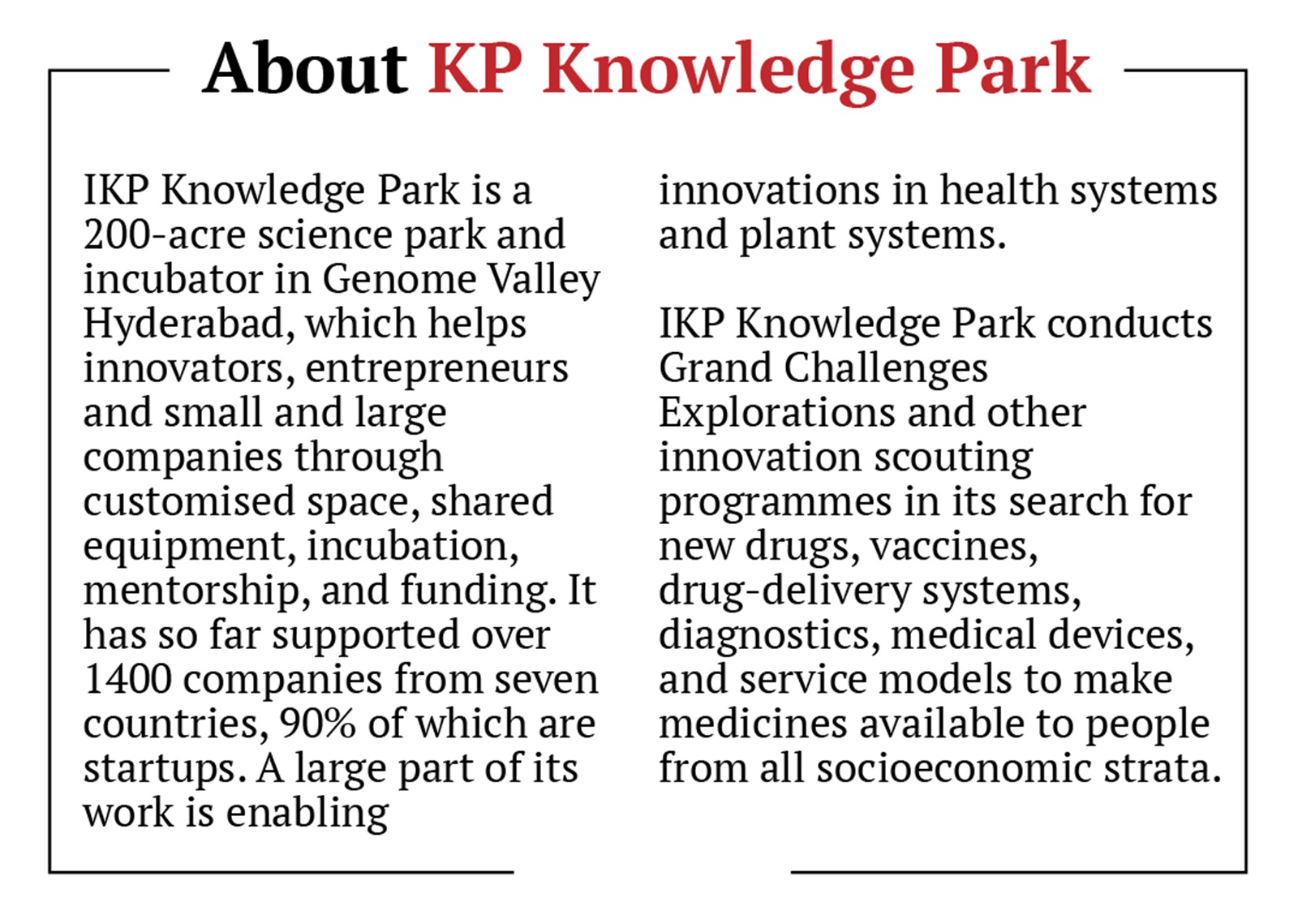 IKP Knowledge Park, Hyderabad, is the first life science research park in India.
IKP Knowledge Park, Hyderabad, is the first life science research park in India.
Deepanwita spoke to indianexpress.com on the challenges faced by life sciences startups, the need for patient capital in deeptech research, and IKP’s mentoring of life sciences startups among other things. Edited excerpts:

Venkatesh Kannaiah: Can you give us an overview of areas of emerging innovation globally in the life sciences domain, and its social impact.
Deepanwita Chattopadhyay: Innovations in healthcare, agriculture, food and nutrition, and environment are areas of interest globally. On one hand there is the building of large scale infrastructure of super specialty hospitals by governments and the private sector, but more interesting is the emphasis on remote healthcare, better access to health through the use of multiple digital tools, and better diagnostics delivered both in-person and in a remote manner.
There are also growing innovations in the decision support systems for doctors, use of artificial intelligence and machine learning, and use of large databases to glean patterns and suggest remedies. For example, there is a company Niramai, which innovates on breast cancer screening and uses data and AI to screen faster. Another example is one of our incubated startups, Predible Health, that uses AI for accurately analysing MRI and other radiology images to help the doctor in his diagnosis and treatment of organ-specific cancer, especially lung cancer.
With better understanding of genetics, genomics and the vast intrinsic differences among people, there is a shift from the “one size fits all” paradigm where the same medicine or treatment is used to treat all people, to an increased interest in innovations centred around personalised healthcare solutions. A growing focus is on treating cancer with personalised cell- and gene-based therapy. As of now these treatments are extremely expensive. Many startups in India are now innovating to bring down the cost of these medical interventions substantially.
There are also innovations in nutraceuticals and smart proteins, with a focus on plant-based proteins for vegetarians. In agriculture, we are witnessing innovations across the value chain from crop, pest and soil management to areas like hydroponics and better water management techniques.
There is now the concept of ‘Onehealth’ where we have begun to see the health of humans, animals and plants as an integrated whole. The impact of climate change and the movement of pathogens from birds to humans and from animals to humans are forcing us to rethink health. This would be a paradigm change and I believe most new innovations would be tested on how much it is taking the ‘onehealth’ idea into consideration and the risk of unintended consequences.
Venkatesh Kannaiah: Tell us about startups incubated/mentored/funded by you which you think will have a large social impact.
Deepanwita Chattopadhyay: We have engaged with more than 1400 startups so far, and many have become hugely successful in their social impact and in raising funds.
Laurus Labs is IKP’s first incubated company which has transformed itself from an active pharmaceutical ingredients company focusing largely on oncology and HIV to an integrated research-based pharmaceutical and biotechnology company. Their work ranges from generic formulations, custom synthesis, biotechnology, veterinary APIs as well as investing in innovations in cell and gene therapy. They work with all the top generic pharma companies in the world, and have more than 200 patents in their areas of work. I consider it as one of the leading impactful companies at IKP and a successful model for many to emulate.
GPS Renewables is a waste-to-energy technology company that is pioneering the development of clean and low-cost technology for waste management solutions. It is also India’s leading full-stack biofuels firm, offering technology and project development solutions for bioCNG, Ethanol and green hydrogen solutions. . They have also commissioned Asia’s largest Bio-CNG plant in Indore, and have also built an EV charging station in Mumbai based on biogas.
Logy.AI is a small and early-stage company which uses AI and ML in training their databases to screen for cataract patients, and enable this screening to be carried out through a smartphone. This would facilitate large scale screening in remote parts of the country.
Remedio is a company which has built solutions to treat diabetic retinopathy and other eye diseases like glaucoma. This is also a solution in the field of remote monitoring, but here a proprietary imaging system is used instead of a smartphone camera. It is decentralising comprehensive eye testing using AI and telemedicine, with simple ophthalmic devices. Even inexperienced volunteers can use these products with minimal training.
Dozee is another company that has an innovation wherein a sheet with sensors is placed below the mattress which captures the micro-vibrations that are emitted from the body through heartbeats, respiration cycle, and body movement. The data is sent to the secure cloud which converts it into meaningful bio-markers.
 “We have worked extensively with the Biotechnology Industry Research Assistance Council (BIRAC) of the Department of Biotechnology, GoI on grand challenges in various aspects of health,” says Deepanwita.
“We have worked extensively with the Biotechnology Industry Research Assistance Council (BIRAC) of the Department of Biotechnology, GoI on grand challenges in various aspects of health,” says Deepanwita.
Venkatesh Kannaiah: Can you tell us about your challenge grants and interesting startups that have emerged from these initiatives?
Deepanwita Chattopadhyay: We are a pioneer in being the programme implementing partner in India of the global Grand Challenge Explorations of the Bill & Melinda Gates Foundation way back in 2011. We ran the Tuberculosis grand challenge in India, with Gates Foundation, USAID, BIRAC and FCDO-UK and identified many innovations.
India is among the countries with a very high incidence of tuberculosis. Among the many startups which went through our cohort was Everwell Health which worked in the realm of drug regimen compliance by patients by developing their digital product called 99DOTs. We globally have a standard called Directly Observed Therapy (DOT) where health workers need to manually monitor the patients taking in the medicines. Since this poses a huge challenge, many innovations were built around the theme of drug adherence, and 99DOTS was among the most innovative, widely adopted in India and globally.
We also worked on five grand challenges with the government of Karnataka, one of the themes being industrial waste water where the startup Greenvironment provided an elegant solution that was adopted by various housing complexes and industries.
Right at the beginning of COVID-19, we set up a small fund called the IKP COVID Fund or I-CO Fund to quickly gather many startups to work on various solutions for pandemic control from masks and PPEs to diagnostics and non-invasive ventilators.
We have worked extensively with the Biotechnology Industry Research Assistance Council (BIRAC) of the Department of Biotechnology, GoI on grand challenges in various aspects of health, from infectious diseases to maternal and child health and digital health. We have mentored many startups. One of them is Janitri Innovations, which works to develop sustainable, affordable vitals monitoring devices and software to monitor the journey of pregnancy, and childbirth. It offers a wide range of antenatal and childbirth monitoring products.
Another interesting startup is Parisodhana, which has come up with a palm-sized product StayWarm which provides comfortable warmth without any need for power supply or batteries. These pouches fit conveniently in pockets, gloves, or shoes and provide 6-8 hours of warmth. They are also working on the area of particulate materials in the field of air activated warming platforms. This technology can provide solutions to various on the go heating and warming needs of users. Various products are being tested to perform at very high altitudes and cold climates. These are now being used by Indian soldiers in the Siachen area.
Venkatesh Kannaiah: How is the startup ecosystem in your domain in India, are startups getting funded, and what are the challenges and opportunities.
Deepanwita Chattopadhyay: You must understand that life sciences are a long gestation, IP driven area, with deep tech-based research products, and which requires patient capital, with no quick returns. It is also a field which requires validation of the products and the regulatory processes and practices to be adhered to. It takes a minimum of 5-10 years for the product to reach the market, and most of the early funding comes from grants and government investments.
However, the industry is maturing now and life sciences focussed funds are emerging. Earlier, we were hardly innovating products in the biopharma sector, and were mostly in process innovation and generic drug manufacturing with off patent drugs. The pharma and biopharma sector is now moving up in the innovation spectrum, with work around green chemistry, biosimilars and biologics.
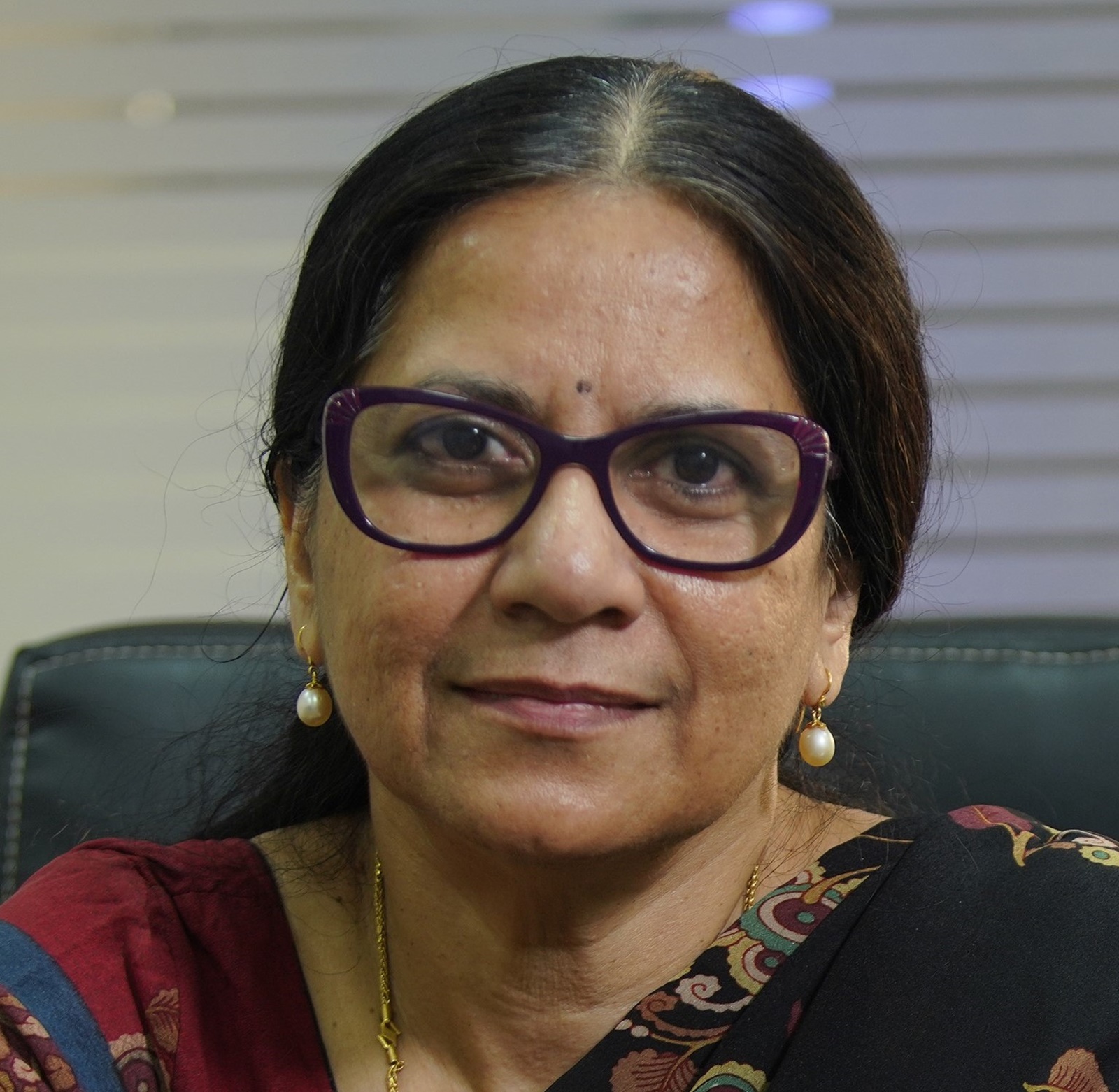 “India has now the opportunity to become the bio-manufacturing hub of the world,” Deepanwita says.
“India has now the opportunity to become the bio-manufacturing hub of the world,” Deepanwita says.
Venkatesh Kannaiah: What are biosimilars and why are they important to India?
Deepanwita Chattopadhyay: Biosimilars are a biological drug that is very much like another biological drug (called the innovator reference drug) that has already been approved by the regulator, for example by the U.S. Food and Drug Administration (FDA). Biosimilar drugs and reference drugs are made from living organisms but they may be made in different ways and of slightly different substances. Biosimilars will have a positive impact on drug pricing and would lead to affordable pricing of certain kinds of medicines, which are now very expensive, and which are used to treat cancer, kidney diseases, chronic arthritis among others. This is key as many of the expensive biologic drugs being used in developed countries might be losing their patents, and might lead to the production of similar drugs, or biosimilars.
The next big thing for India would be biomanufacturing. We are considered the pharmacy of the world supplying generic pharmaceutical medicines worldwide. India has now the opportunity to become the bio-manufacturing hub of the world. It is not just about manufacturing biosimilars but the whole gamut of biologics.
Venkatesh Kannaiah: What would be your big bet for the sector which you think might have a huge impact if it works?
Deepanwita Chattopadhyay: It’s a long haul, but I feel cell and gene therapy for cancer and in general immunotherapy is an area where India can bring the price down several orders to make treatments affordable in the long run. Several companies are working in this space, and I am proud to say that Laurus Labs is investing in this area that could be a game changer in the long run.
More Tech
May 09: Latest News
- 01
- 02
- 03
- 04
- 05








